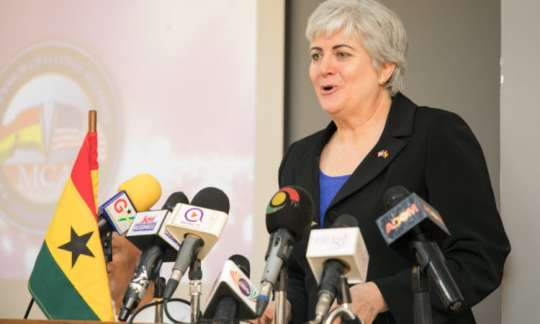
Ms Stephanie Sullivan – U.S Ambassador to Ghana
U.S. Ambassador to Ghana Stephanie S. Sullivan joined Ghana’s Minister of Education, Dr. Matthew Opoku Prempeh, in launching the Ghana Learning Radio: Reading Program. Developed in response to the closure of over 25,000 primary schools nationwide due to the COVID-19 global pandemic, the radio program will engage parents, caregivers, and students through daily broadcasts to support and improve reading among Ghana’s primary school age students.
Because of the pandemic, millions of primary school students are out of school. To address this challenge, the Ministry of Education partnered with the U.S. government through the U.S. Agency for International Development (USAID) to design a national radio program in reading. The program will provide distance learning instruction in English and the 11 official Ghanaian languages of instruction for Kindergarten Two through fourth grade students.
The Ghana Education Service (GES), in collaboration with the Ghana Broadcasting Corporation (GBC), will start broadcasting interactive and easy-to-follow reading lessons on June 15, 2020. The lessons are adapted from USAID-supported instructional materials validated by the National Council for Curriculum and Assessment. Broadcasts will also include health and safety behavior-change messaging that focus on handwashing, social distancing, and child-protection as well as messages to parents and caregivers to encourage homework supervision, family health and hygiene, and the prevention of bullying, sexual assault, and early pregnancy.
All GBC radio stations will broadcast one-hour reading instruction sessions from 10:30 a.m. to 11:30 a.m. on Mondays, Wednesdays, and Fridays, with repeat broadcasts of the lessons on Tuesdays, Thursdays, and Saturdays from 4:00 p.m. to 5:00 p.m.
The United States continues to lead in the face of the COVID-19 pandemic, illustrated by recent announcements of new foreign assistance that are made possible through the American people’s generosity and the U.S. Government’s action. The American people have given more than $11 billion U.S. that will benefit the global COVID-19 response and continue to ensure that the substantial U.S. funding and scientific efforts on this front remain a central and coordinated part of the worldwide effort against the disease. In Ghana, the United States has provided almost $17 million U.S. to address immediate impacts of COVID-19 by helping to strengthen health systems and to continue to improve reading outcomes. The United States is also addressing long-term impacts by helping to develop environments for economic growth and conflict mitigation.























